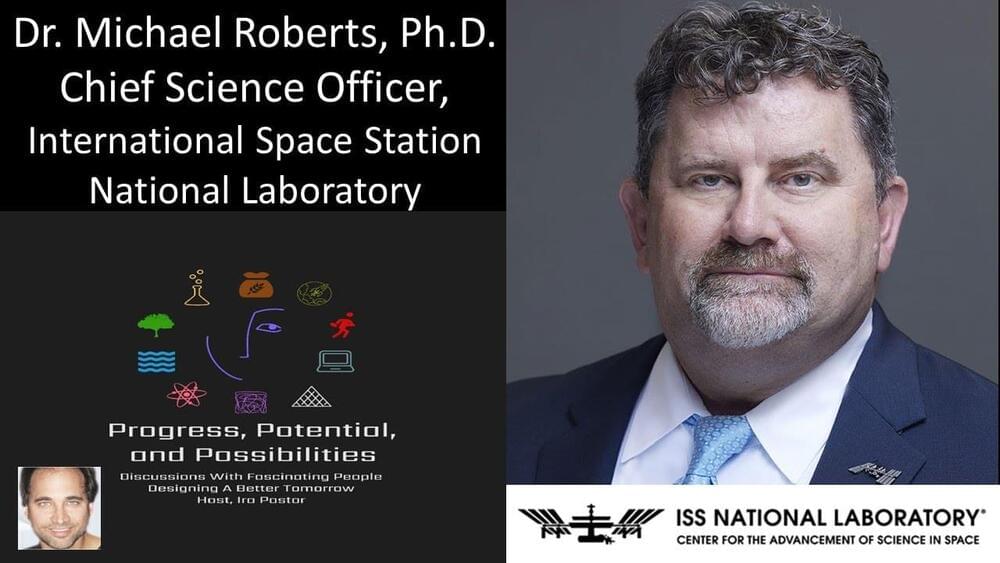Jul 24, 2023
How spirituality protects your brain from despair
Posted by Dan Breeden in category: neuroscience
Modern life replaced spirituality with goal-setting — and it’s making us depressed. Here’s how to win back your happiness.
Modern life replaced spirituality with goal-setting — and it’s making us depressed. Here’s how to win back your happiness.

Did the JWST just find evidence for dark matter stars? NASA released new findings by the james webb telescope where it may have found three possible candidat…

While the introduction of AI technologies promises to amplify the advantages of Kubernetes, these technologies are still a double-edged sword.
A study shows it’s possible to use laser-based systems with optical transistors to transfer information far more quickly than possible today.

Dr. Michael Roberts, Ph.D. is Chief Science Officer of the International Space Station National Laboratory (https://www.issnationallab.org/), and Vice President at the Center for the Advancement of Science in Space (CASIS — https://www.issnationallab.org/about/center-for-the-advancem…dership/), which as manager of the ISS National Laboratory in partnership with NASA, is responsible to the nation for enabling access to the International Space Station for research, technology development, STEM education, and commercial innovation in space as a public service to foster a scalable and sustainable low Earth orbit economy.
Before joining CASIS in 2013, Dr. Roberts worked as a microbial ecologist, principal investigator, and research group lead in the NASA Advanced Life Support program at the Kennedy Space Center.
You’ve probably heard about SpaceX’s plans to use its giant new Starship vehicle to land people on the Moon and Mars, send numerous Starlink satellites or large telescopes into space, or perhaps even serve as a high-speed point-to-point terrestrial transport for equipment or people.
There’s another application for SpaceX’s Starship architecture that the company is studying, and NASA is on board to lend expertise. Though still in a nascent phase of tech development, the effort could result in repurposing Starship into a commercial space station, something NASA has a keen interest in because there are no plans for a government-owned research lab in low-Earth orbit after the International Space Station is decommissioned after 2030.
The space agency announced last month a new round of agreements with seven commercial companies, including SpaceX. The Collaborations for Commercial Space Capabilities (CCSC) program is an effort established to advance private sector development of emerging products and services that could be available to customers—including NASA—in approximately five to seven years.
“The new research program, led by Associate Professor Adeel Razi, from the Turner Institute for Brain and Mental Health, in collaboration with Melbourne start-up Cortical Labs, involves growing around 800,000 brain cells living in a dish, which are then “taught” to perform goal-directed tasks. Last year the brain cells’ ability to perform a simple tennis-like computer game, Pong, received global attention for the team’s research.”
Monash University-led research into growing human brain cells onto silicon chips, with new continual learning capabilities to transform machine learning, has been awarded almost $600,000 AUD in the prestigious National Intelligence and Security Discovery Research Grants Program.
According to Associate Professor Razi, the research program’s work using lab-grown brain cells embedded onto silicon chips, “merges the fields of artificial intelligence and synthetic biology to create programmable biological computing platforms,” he said.
Continue reading “Research to merge human brain cells with AI secures national defence funding” »
A team of ingenious bioengineers at Arizona State University (ASU) has harnessed the power of childhood nostalgia, unveiling a creative solution to a long-standing challenge in DNA origami research.
They’ve successfully employed a LEGO robotics kit to build an affordable, highly effective gradient mixer for purifying self-assembling DNA origami nanostructures. This innovative breakthrough, detailed in a paper published one PLOS ONE, promises to revolutionize how scientists approach DNA origami synthesis.
The creation of DNA origami structures is an intricate process, requiring precise purification of nanostructures. Traditionally, this purification step involved rate-zone centrifugation, relying on a costly piece of equipment called a gradient mixer. However, the maverick minds at ASU have demonstrated that even the iconic plastic bricks of LEGO can be repurposed for scientific advancement.
To celebrate National Moth Week, bask in the beautiful variety of these oft-overlooked insects.
July 24 (Reuters) — Worldcoin, a cryptocurrency project founded by OpenAI CEO Sam Altman, launched on Monday.
The project’s core offering is its World ID, which the company describes as a “digital passport” to prove that its holder is a real human, not an AI bot. To get a World ID, a customer signs up to do an in-person iris scan using Worldcoin’s ‘orb’, a silver ball approximately the size of a bowling ball. Once the orb’s iris scan verifies the person is a real human, it creates a World ID.
The company behind Worldcoin is San Francisco and Berlin-based Tools for Humanity.
